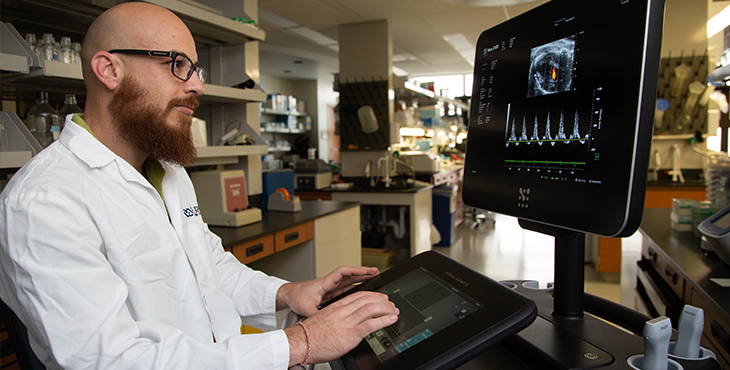Dimosthenis Giamouridis is a research associate in Dr. Kirk Hammond’s lab at the VA San Diego Healthcare System and the University of California San Diego. The team has shown, in mice, that gene therapy can improve a diabetes-related heart ailment. (Photo by Kevin Walsh)
Researchers with the VA San Diego Healthcare System and the University of California San Diego have shown that gene transfer may help a heart problem caused by diabetes.
Working with mice, the researchers showed that a single injection to boost levels of a hormone called urocortin 2 (UCn2) increased function in the heart’s left ventricle function. The treatment also improved how the body processed glucose.
The researchers say the work could eventually lead to new clinical treatments.
The study appeared in March in the journal Human Gene Therapy.
Researcher Dr. Kirk Hammond explained that a single dose of an agent that both reduces blood sugar and increases heart function would be attractive to patients with diabetes.
Diabetes affects 29 million Americans. Nearly 25 percent of VA’s patient population have the condition. It increases the risk of cardiovascular disease, and death rates from heart disease are two to four times higher for adults with diabetes.
One major problem caused by diabetes is left ventricle dysfunction. The ventricles are the largest chambers of the heart. The right ventricle pumps blood to the lungs to receive oxygen. The left ventricle pumps the blood to the rest of the body. Diabetes can cause the walls of the left ventricle to thicken and become fibrous. This stops it from pumping properly.
Previous studies by the research team showed that UCn2 gene transfer increases cardiac function in normal mice and increases function in the failing heart (caused by heart attack). In the current study, the researchers wanted to see whether this same gene transfer technique would improve heart dysfunction caused by diabetes.
A longer version of this article originally appeared in VA Research Currents.
To learn more about VA research on diabetes and heart disease, visit the topic pages section of the VA Research website.
Topics in this story
More Stories
In a new series that highlights advancements in VA health care, VA researchers and clinicians are appearing on a Veteran-themed media platform—Wreaths Across America Radio—to tout their critical work.
Recently published findings from the VA Disrupted Care National Project [...]
Diverse representation of women in health care research allows MVP to make discoveries for women’s health






